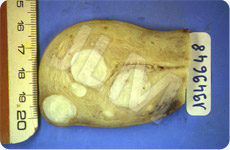Fibromas are benign tumors. Doctors also term them fibroids, fibroid tumors, myomas, fibromyomas, or leiomyomas. They are the result of a proliferation of muscle cells arising from the uterine wall. They vary in size from pea sized to tennis ball size to even, in rare cases, grapefruit size or even bigger. These tumors have the consistency of a golf ball.
Fibromas resemble balls (myomas) which grow on a wall (the lining of the uterus).
-
 When fibromas occur within the uterine cavity they are termed submucosal fibromas. They can provoke heavy or prolonged bleeding (menorrhagia) sometimes with clots. They can also lead to infertility since the ball like growth can inhibit successful embryo implantation.
When fibromas occur within the uterine cavity they are termed submucosal fibromas. They can provoke heavy or prolonged bleeding (menorrhagia) sometimes with clots. They can also lead to infertility since the ball like growth can inhibit successful embryo implantation.
-
 When fibromas grow on the outside of the uterus they are termed subserosal fibromas. Unless they are very large, these rarely cause any symptoms. In terms of size, large fibromas can measure several tens of centimeters resembling a melon or bigger. In these cases such fibromas can compromise the bladder, the urethras, and leave the patient with the feeling of wanting to pass urine to the extent that the kidneys may even dilate. There may also be difficulties in giving birth when the baby is sitting low (Praevia).
When fibromas grow on the outside of the uterus they are termed subserosal fibromas. Unless they are very large, these rarely cause any symptoms. In terms of size, large fibromas can measure several tens of centimeters resembling a melon or bigger. In these cases such fibromas can compromise the bladder, the urethras, and leave the patient with the feeling of wanting to pass urine to the extent that the kidneys may even dilate. There may also be difficulties in giving birth when the baby is sitting low (Praevia).
-
 When fibromas grow inside the uterine wall (between the uterine cavity and the outside of the uterus) they are terms interstitial fibromas. This is considered as an intermediate situation and does not always exhibit any symptoms. These fibromas are not a problem as such but they can require attention when they become large and voluminous and when they risk inhibiting fertility (especially as regards IVF (in vitro fertilisation) treatments).
When fibromas grow inside the uterine wall (between the uterine cavity and the outside of the uterus) they are terms interstitial fibromas. This is considered as an intermediate situation and does not always exhibit any symptoms. These fibromas are not a problem as such but they can require attention when they become large and voluminous and when they risk inhibiting fertility (especially as regards IVF (in vitro fertilisation) treatments).
In reality, multiple fibromas can be a mix of these three cases and require specific tailored treatment based on the results of ultrasound scans, hysteroscopy procedures and sometimes MRI (magnetic resonance imaging) scans.

Fibromas or myomas are benign tumors. Nevertheless caution is required to verify the absence of any associated lesions which may themselves be malignant especially for post-menopausal patients.
Myomas are benign tumors in the uterus made up of muscular tissue and they can lead to pain, bleeding or problems with falling pregnant. When myomas have no symptoms then they are monitored and do not need to be removed or treated.
When myomas exhibit no symptoms, which is –normally- the case, then they are monitored and do not need to be removed or treated.



